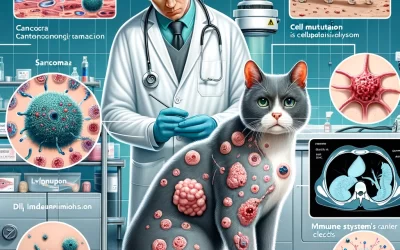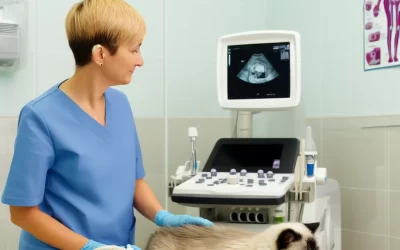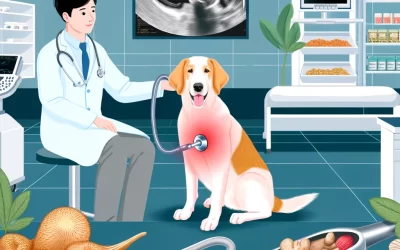Navigating Tumor Treatment for Cats: A Guide for Pet Owners
When a beloved cat is diagnosed with a tumor, understanding the best treatment options is crucial....
Understanding Feline Cancer: Types, Risks, and Treatments
Introduction Cancer in cats is a broad term for a range of diseases that, while distinct in type...
Understanding Feline Tumors: Symptoms, Diagnosis, and Treatment Options
Cats, like humans, can suffer from various types of tumors, which can significantly impact their...
Understanding Feline Tumors: Common Signs and Recent Advances in Treatment
As cats live longer due to advancements in science and technology, the likelihood of feline tumors...
Mammary Tumors in Cats: Overview
Mammary tumors are a major health issue in older cats, accounting for about 17% of all tumors in...
Understanding Common Feline Tumors: Types and Treatment Options
Cancer remains a leading cause of death in mammals, including humans and pets, and presents...
Understanding Cancer Risks in Different Dog Breeds: A Guide to Six High-Risk Breeds
Cancer indiscriminately affects dogs of all ages and breeds, yet some breeds due to genetic...
10 Symptoms of Cancer in Dogs: Early Detection Can Prevent Worsening
When humans fall ill, our family members can immediately tell. However, dogs cannot clearly...
How to Tell if Your Dog’s Tumor is Benign or Malignant: A Detailed Guide
Discovering a tumor on your beloved dog can be alarming. Understanding the nature of the...
How to Effectively Prevent and Recognize Canine Tumors: A Comprehensive Guide
Dogs are not just pets; they are loyal companions. As responsible pet owners, it’s our duty to...
Integrative Approaches to Managing Your Dog’s Lipomas
Introduction While conventional treatment options like surgery are commonly recommended for...
Navigating Through Your Dog’s Lipoma Diagnosis: A Guide for Pet Owners
Introduction Discovering a lipoma on your dog can be unsettling. These benign fatty tumors are...
TCMVET Baituxiao and Cancer Care for Pets
Can TCMVET Baituxiao be used to support pets undergoing cancer treatment? Yes, TCMVET Baituxiao is...
How TCMVET Baituxiao Supports Pet Immunity and Overall Health
What unique ingredients are found in TCMVET Baituxiao, and what are their roles? TCMVET Baituxiao...
Are there any specific conditions or pets that benefit most from TCMVET Baituxiao?
TCMVET Baituxiao is especially beneficial for pets dealing with various types of tumors and...
How can TCMVET Baituxiao help pets recovering from surgery or illness?
Recovery from surgery or illness can be a challenging time for pets. TCMVET Baituxiao supports...
TCMVET:Elevating Pet Wellness with Traditional Chinese Veterinary Medicine
At TCMVET, our mission is simple yet profound: to enhance the health and vitality of companion...
Unveiling the Power of TCMVET Baituxiao: A Holistic Approach to Pet Health
In the realm of pet care, few things are as distressing as witnessing our beloved companions...
Revolutionizing Canine Oncology with Ancient Chinese Herbs
The world of canine oncology is undergoing a transformative phase with the integration of Ancient...
Integrating Herbal Therapy in the Battle Against Dog Cancer
The fight against canine cancer is an ongoing battle for many pet owners. While conventional...
Nature’s Answer to Canine Tumors: Exploring Herbal Treatments
In the quest for effective and gentle treatments for canine tumors, pet owners and veterinarians...
Boosting Your Dog’s Health: Traditional Chinese Herbs for Fighting Cancer
As more dog owners seek natural ways to support their furry companions, especially in combating...
Herbal Remedies for Canine Cancer: A Safe and Effective Approach
Canine cancer, a prevalent issue among aging pets, poses significant challenges to pet owners...
Herbs for Hounds: Revolutionizing the Treatment of Canine Mast Cell Tumors
In the ever-evolving field of veterinary medicine, a novel approach is gaining momentum: the use...
Balancing Modern and Ancient Medicine: Chinese Herbal Therapies for Canine MCTs
In the evolving world of veterinary medicine, the balance between modern and ancient practices is...
A New Frontier in Canine Mast Cell Tumor Management: Herbal Medicine
In the evolving world of veterinary oncology, the management of canine mast cell tumors (MCTs) is...
Integrating Holistic Care in Veterinary Oncology: Chinese Herbs for Dog Tumors
The field of veterinary oncology is witnessing a paradigm shift with the integration of holistic...
Enhancing Canine Cancer Treatment: The Power of Traditional Chinese Herbs
Canine cancer, a major concern for pet owners and veterinarians alike, requires a comprehensive...
Preventing Mast Cell Tumor Recurrence in Dogs with Chinese Herbal Therapy
Mast Cell Tumors (MCTs) are a significant health concern for many dog breeds, and their recurrence...
The Role of Chinese Herbs in Managing Mast Cell Tumor Symptoms in Dogs
Mast Cell Tumors (MCTs) are a prevalent form of cancer in dogs, and managing their symptoms is a...
Boosting Immunity in Dogs with Mast Cell Tumors: Chinese Herbal Solutions
Mast Cell Tumors (MCTs), a common form of cancer in dogs, present significant health challenges....
Herbal Remedies for Canine Mast Cell Tumors: A Holistic Approach
Mast Cell Tumors (MCTs) in dogs are a significant concern for pet owners, characterized by the...
Mast Cell Tumors in Dogs: Integrating Traditional Chinese Medicine for Treatment
Mast Cell Tumors (MCTs) are one of the most common types of skin cancers found in dogs. They can...
Integrating Western and Eastern Medicine for Mediastinal Tumor Treatment in Animals
The realm of veterinary medicine is evolving, and one of the most significant advancements is the...
Tackling Respiratory Distress in Pets with Chinese Herbs: Focus on Mediastinal Masses
Respiratory distress in pets, often a symptom of underlying conditions such as mediastinal masses,...
Herbal Remedies for Rare Mediastinal Tumors: Harnessing Ancient Wisdom
In the dynamic field of veterinary oncology, the treatment of rare mediastinal tumors in pets...
Thymomas and Lymphomas in Pets: Traditional Chinese Medicine Approaches
When it comes to managing pet health, particularly complex diseases like thymomas and lymphomas,...
Exploring Mediastinal Tumors in Veterinary Medicine: A Chinese Herbal Perspective
In the realm of veterinary medicine, the diagnosis and treatment of mediastinal tumors represent a...
TCM Approaches to Canine and Feline Throat and Tracheal Tumors
Throat and tracheal tumors in dogs and cats present a significant challenge in veterinary...
Herbal Healing: Chinese Medicine in the Fight Against Pet Cancer
The increasing prevalence of cancer in pets has led to a growing interest in alternative...
Balancing Animal Energies: Using TCM to Treat Pet Tumors
The ancient practice of Traditional Chinese Medicine (TCM) offers a unique and holistic approach...
Ancient Wisdom for Modern Pets: Treating Cancer with Chinese Herbal Remedies
The holistic approach of Traditional Chinese Medicine (TCM) has been a cornerstone in human...
Harmonizing Yin and Yang in Pet Cancer Therapy with Traditional Chinese Medicine
In the realm of veterinary medicine, an increasing number of pet owners are turning towards...
TCM for Pets: A New Horizon in Treating Canine Skin Cancer
The integration of Traditional Chinese Medicine (TCM) into the realm of veterinary science opens a...
Blending Eras: Using Ancient Chinese Medicine Principles in Modern Veterinary Oncology
The merging of ancient wisdom with contemporary science is revolutionizing the field of veterinary...
From Fields to Fido: Adapting Traditional Chinese Medicine for Dog Cancer Care
In the journey to holistic pet health, Traditional Chinese Medicine (TCM) is emerging as a...
Reviving Herbal Wisdom: TCM’s Role in Combating Canine Squamous Cell Carcinoma
The resurgence of Traditional Chinese Medicine (TCM) in modern veterinary care is opening new...
Ancient Remedies Meet Modern Challenges
The intersection of traditional Chinese medicine (TCM) and modern veterinary care presents a...
Tradition Meets Technology: Applying Ancient Chinese Medicinal Knowledge to Canine Oral Oncology
The convergence of traditional Chinese medicinal knowledge with modern technology in the field of...
From Herbal Roots to Healing Paws
The field of veterinary medicine has undergone a remarkable evolution, especially in the treatment...












-400x250.jpg)
-400x250.jpg)
-400x250.jpg)
-400x250.jpg)

































